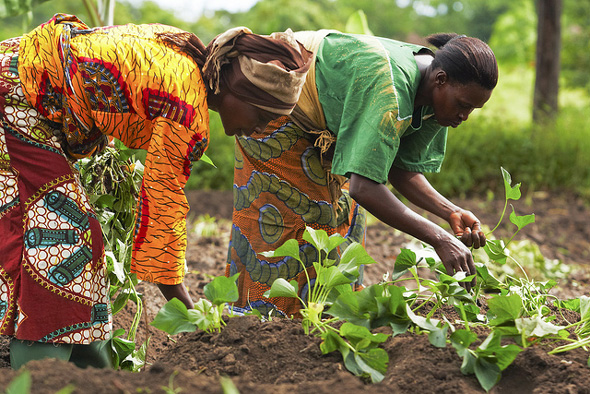-
Green Solutions for Africa’s Urban Food Security
September 26, 2012 By Payal Chandiramani
Following the steady economic growth that many African countries have experienced in recent years and continued population growth, urbanization has accelerated rapidly on the continent as people turn to cities to take advantage of new economic opportunities. But growing cities have led to another problem. According to a new Food and Agriculture Organization (FAO) report, Growing Greener Cities in Africa, urban populations are exceeding the capacity of African cities to provide food for them, putting nearly 300 million people at risk of hunger and malnutrition, and greener strategies – urban agriculture and better water use – could help considerably.
The report – the first of its kind – analyzes urban and peri-urban agriculture in African cities based on surveys and case studies from 31 countries. The authors urge policymakers “to act now to steer urbanization from its current, unsustainable path towards healthy, ‘greener’ cities that ensure food and nutrition security, decent work and income, and a clean environment for all their citizens.”
As economic growth in Africa increases, many people from rural areas are being drawn towards the cities in search of a better life only to find little or no improvement from their rural poverty. Africa’s urban population increased from 53 million to 400 million between 1960 and 2010. With the FAO estimating a further 345 million people moving to urban areas in the next 18 years and a doubling of the urban population in sub-Saharan Africa to almost 600 million, the continent finds itself at a critical juncture for urban sustainability and resource management.
But child malnutrition in urban areas is on par with that of the rural countryside, and more than half of all African city-dwellers live in slums, according to the report. Almost 200 million people survive below the poverty level of less than $2 a day.
The report presses for an immediate reimagining of African cities and their methods of sustainability. Previous instances of economic growth, the authors write, have only brought further economic inequality, poverty, malnutrition, and poor sanitation to urban residents on the continent.
The FAO report suggests special zoning for urban horticulture, which would encourage an existing trend. Forty percent of residents in sub-Saharan African cities have home gardens. Most of these urban farmers are able to meet their nutrition needs and still produce enough to sell in markets. Northern African cities have been slow to adopt home gardens though, and land that can be used for horticulture is instead being allocated to housing, industry, and infrastructure.
Home gardens would increase the supply of food, thereby putting downward pressure on food prices, and also provide a reliable way for the urban poor to access fresh fruits and vegetables, which are often the first things to stop being consumed when food prices increase.
Growing Greener Cities in Africa recommends that existing home gardeners adopt the FAO’s “save and grow” farming model to encourage sustainability and preserve natural resources. The model includes recommendations that are specific to Africa’s geography and climate, such as harvesting rainwater to reduce dependence on groundwater resources in the Sahel and increasing the use of compost in soil to produce more with fewer pesticides and less water. Composting is not only cheaper than chemical fertilizers, but also helps to manage waste in Africa’s urban areas – which generate an astounding 50 million tons of garbage every year that can be composted. An efficient supply chain consisting of urban farmers’ markets supported by city authorities and citizens alike is also necessary for successful urban and peri-urban agriculture.
Use of untreated wastewater and pesticides are growing concerns as farmers try to increase efficiency. The FAO’s objective in promoting home gardens in African cities is to improve the quality of life for increasing numbers of city-dwellers by allowing them to grow fresh, nutritional food for themselves as well as earn some additional income from the sale of excess crops. Accompanied by green practices for maintaining these gardens, the FAO says these policy changes encourage more sustainable and prosperous urban growth.
Sources: Food and Agriculture Organization of the United Nations, The Guardian Nigeria.
Photo Credit: Tanzanian farmers, courtesy of the Bill and Melinda Gates Foundation.
Topics: Africa, agriculture, development, economics, environment, featured, food security, global health, nutrition, population, sanitation, urbanization, water
 A Publication of the Stimson Center.
A Publication of the Stimson Center.



